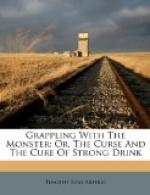We press this subject on the reader’s attention, because so much of success or failure in this great Gospel temperance work depends on a right understanding of spiritual laws and a true comprehension of the means of salvation. Holding, as we do, that, for the thousands and hundreds of thousands of unhappy and wretched men and women in our land who have become the almost helpless slaves of an appetite which is rarely, if ever, wholly destroyed, no true succor lies in anything but Divine grace and help, we feel that a great responsibility rests with all who, in the providence of God, have been drawn into this work.
Referring to the loose, and we cannot help saying hurtful teachings of too many temperance revivalists, Rev. Charles I. Warren, writing in the New York Christian Advocate, says:
“Religious conversion, all are agreed, is the first necessity for all men, and especially for inebriates, as the surest hope of a real and permanent reformation of life. And intemperate men, especially those who become demented rather than demonized, it is well known, are always easily moved by religious influences, even when so drunk that they would wisely be deemed incompetent to execute a will for the disposal of earthly property, and incapable of giving testimony in a court of law.
“Yet, this idea of a spiritual renovation of the heart, while the head is too intoxicated to apprehend a moral obligation, is almost beyond rational belief. It is difficult to conceive that any man, in such a state of voluntarily-induced imbecility, too drunk to hold intelligent converse with men, can be competent to transact business with God, to receive and answer those calls from the Holy Spirit that decide the eternal destinies of the soul.”
And he adds: “We judge instinctively that all men, intemperate or sober, must work out their own salvation with fear, while God works in them to will and to do.”
This is the key-note to the whole subject of spiritual regeneration. It is active co-operation; work, conflict, victory; and this down on the sphere of common life, and in the midst of temptation—not out of the world, but “in the world;” not something done in and for a man while he waits in prayer on God, but after he has fought his battle with some enemy of his soul, and overcome in the strength which God has given him in answer to prayer. Only they who have fought and conquered can possess the land and dwell there in safety.
AN UNSOUND AND DANGEROUS DOCTRINE.
In a meeting at which we were present, and where from one to two hundred reformed men were gathered for religious worship, and for help and counsel, the hymn commencing
“Prone to wander, Lord I feel it,”




